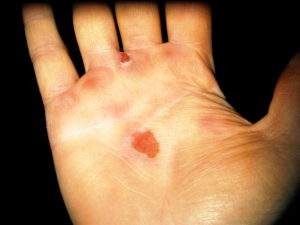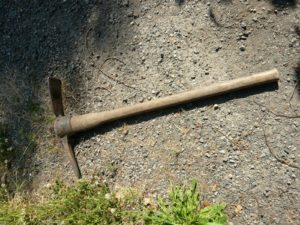It’s spring and in addition to our usual vegetable garden and some existing fruit crops, we are putting in a row of 15 blueberry bushes. Well the past two nights I’ve been outside for 3-4 hours digging a trench (about 40′ long by 2.5′ wide and 1′ deep. right, I said feet.) by hand and then started to refill it with better dirt basically. Plenty of time for the mind to wander about a host of topics, including this post. As I worked a few lessons that apply to the day job came to mind. Good lessons no matter what you do but I’ll spin the SQL side, obviously… Since it is still Professional Development week at SQL University, I figured I’d post this week. Maybe you’ll take something useful from it, or maybe this is all for me. The previous Professional Development post for SQL University was on sharing knowledge.
Lessons (In No Particular Order)

1.) It Isn’t Weak To Use Help – I don’t really own a good pair of work gloves. My wife has some flowery gardening gloves. The first night of shoveling in bouldery/rocky hard-pan clay, I figured “real men don’t wear work gloves!” I seem to recall re-learning this lesson every so often working outside.
Books Online is a friend – The day job corollary in my mind is – use the help that is available. Most of the time it is a sign of strength, not weakness to use a help source. The end results can mean happier customers and a better process (or less pain in the palm of your hand). Tonight, I used the new work gloves I bought at Wal-Mart. Wow. What a difference. I was even more effective. Ever try and solve anything through trial and error only to realize that a trusted source (such as books online) had the answer the whole time? Well that’s how I felt… Use The Resources available to you.
2.) It Helps To Be In Shape – I only took a picture of my hand. No videos of me panting while working or clothing drenched from sweat. I was in much better shape after ActiveAugust last year but I got to the worst shape of my life the past 6 months, let stress get the best of me and sort of gave up on the working out and then the eating healthy… Well I realize the error of my ways and will be working on that…
Back to the day job application – Stay Current With Your Skills – Alright, so some of these analogies will be stretches but it made sense to me when I was out there working and thinking of the lessons. If I were in better shape (lets just say that these past two nights have been the best workout I’ve had in many months) I would have done more and felt better. Don’t be your own enemy – Practice your skills, read blogs, try things out, always be learning and preparing.
3.) Prepare When You Can (File under practice what you preach) – Last fall, I did a lot of prep work for the vegetable garden. We planted a bunch of garlic for summer harvest. That inspired the above linked post reminding folks to plan ahead… Oops. We knew we had the bare root blueberry plants coming but I was busy with work and “busy” slacking off instead of doing this ins small chunks. Do what you can ahead of time, “we’ll take care of it later” usually has a cost.

4.) Use The Right Tool(s) For The Job – I’ve always hated digging on my property. Hard pan clay, boulders just under the grass/loam layer. I’ve always just muttered my way through with a garden shovel. Well, not for this project. 3/4 of the way through my first night of trench duty I remembered my wife’s grandmother had a pick axe (well actually a pick mattock, I think) so I drove down and borrowed it. WOW! If I had one when we first moved in and used it ever since, I would probably have 30 hours of my time back from planting apple trees, making garden beds, planting lilacs and establishing a lawn. It made short work of the rocks, popped big boulders up with a simple swing and a push forward with the mattock providing a fulcrum getting the boulder ready for my greedy hands. I almost am willing to say it made it fun. For the day job? Use the right tool for the job! Maintenance plans have their place for a DBA who isn’t comfortable enough to create database maintenance jobs by scratch, even if you are comfortable. Some may laugh, I won’t. It works. Use a tool for source control, windows explorer (at least by itself with no source control tool add-ons) is not that tool. Use “Helper” Tools – Be it a database monitoring software program, a data comparison tool, a database diagramming tool, etc. there are tools out there that are designed to make life easier for you. I am actually contemplating buying a pick mattock and just leaving it in my cube as a work related tool. Not to actually use, just for intimidation for drive-by’s…
5.) Focus On Your Own Task – It was a bit boring out there and I’ll be honest, I wanted to be done. Anytime I looked forward to what was left or back to how little I’ve gone, it was a bit of a kick in the seat. When I zeroed in on the window of what I was doing (dig, dump, dig, dump) I got a lot further than I realized I was getting. Instead of focusing on what I had left to do I was focused on my task.. Now in the day job it looks a bit different because while zeroing in visually on where I was working my mind was still wandering, I was doing a mindless task and I don’t do Zen. At work I actually mean focus on your task. If it is a deploy, then focus on the step of the deploy script and pay excruciating attention to that one detail. Sounds like common sense but if I don’t work at focus, I can miss a small piece of a puzzle. Do whatever you have to do to maintain that focus.
6.) Remember How Easy You Have It – While digging it occurred to me that this project is nothing compared to what other folks have dug by hand over time. Foundations, Wells, even canals – or am I thinking of the Panama Canal in the basement from Arsenic and Old Lace? anyway… So I spent some time marveling at the kind of things done by hand over time. Ever use an older version of SQL Server? I have recollections of pains in growing a file in SQL Server 6.5 and working an application that often had fun data integrity issues on SQL 6.5 (wasn’t SQL’s fault, if I recall correctly). Things get easier with the new tools and versions that come out. You could always have it worse. 🙂
7.) Quality Now Means Quality Later – Kind of goes with that link about practicing what you preach above but the more quality I put in here, the better chance the blueberries have. Since they are 3 year old plants the plants that bear fruit early should do so in just a couple months. So a little hard work now gives me some fresh, tasty, organic blueberries around June. Keep the end result in mind. Building a new SQL Instance? The more attention you pay to thinking about how you install SQL Server means less time supporting issues later. Creating a new database or developing some code? Think about the code review now, not at the code review. Fix things now while you can and you’ll have more time later.
There you have it. Some random thoughts from a garden project. Time to take some ibuprofen and hit bed 🙂 I’ll set this to schedule on Friday morning sometime. Did I miss any lessons? Any tips for the blueberries? (Besides rent a backhoe, that is). Comments are always open, no registration required.
SQL University Survey
If you would like to participate, SQL University is running a survey to seek feedback on all sessions provided this semester. If you have a few moments please check out the survey. The results will help us blog more relevant content and improve SQLU next semester!


Very true stuff!!! Stuff we have ALL done, like how you put this together!
Thanks! I’m glad you enjoyed it. I was afraid it was a bit to “duh!” to post but then I realized that I had plenty of “violations” even though I know it was common sense stuff. Figured maybe someone else would also 🙂
How true that all is! Went through a similar exercise a few weeks ago in digging up the area for a raised bed in the backyard…and had similar thoughts (hope to build the box this weekend if I can make it to a lumberyard for cedar while I’m awake).
The one thing I might add is thinking about how much of your time to spend focusing on the detail versus thinking about the end result (detail vs big picture, or tactical vs strategic thinking). It’s different for every project, and it’s always easy to swing too much in the wrong direction and lose your way.
Good luck with the raised bed, Keith! Thanks for the additional thought. That is a great point – depending on the task at hand sometimes more or less strategy/tactics are needed. With the trench, I didn’t want to focus on the larger task because I didn’t want to see how much I had to go 🙂 When doing a deploy, I want to have much more focus on the tactics as well so I don’t make a silly mistake. When first reviewing a deploy or discussing a new server, getting lost in the tactics would certainly hurt us all in the long run. Great point that I never really thought of in the original post!